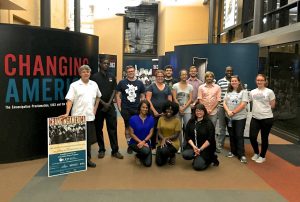
How UCF Public History Students are Changing America One Exhibit at a Time
Graduate students in Dr. Scot French’s Introduction to Public History colloquium are exploring the challenges of interpreting and displaying “difficult history” in museums, historic sites, and other public settings. This week, they had a unique opportunity to discuss those issues while unpacking and assembling a major traveling exhibit that will serve as the centerpiece of public conversations and special programming for the next six weeks.
Changing America: The Emancipation Proclamation, 1863 and the March on Washington, 1963, will be on display at UCF’s Center for Emerging Media in downtown Orlando through Nov. 4. Eighteen boxes, each with a neatly packed red crate and set of instructions, awaited students as they arrived for class Monday night. The students broke into teams of two and began assembling the frames, magnetic struts, and graphic displays for placement on a sketched-out floor plan. Students considered how visitors would move through the 1,400-square-foot exhibition space and adjusted the nine large panels accordingly.
After a break for pizza, the students moved upstairs to a conference room overlooking the exhibit for a discussion of David Pilgrim’s Understanding Jim Crow: Using Racist Memorabilia to Teach Tolerance and Promote Social Justice (PM Press, 2015). They noted the differences between Pilgrim’s relentlessly disturbing Jim Crow Museum of Racist Memorabilia and the more uplifting, civil rights-oriented Changing America exhibit. They also considered strategies for engaging diverse public audiences through “visual thinking” exercises and moderated discussions. Later this fall, they will participate in a UCF-hosted History and Future symposium that imagines the Changing America exhibit in the year 2063.
UCF is one of 50 institutions nationwide selected to host the Changing America exhibit. Funded by a grant from the National Endowment for the Humanities and curated by the Smithsonian Institution’s newly established National Museum of African American History and Culture, the traveling exhibit is designed to promote public understanding of two historical events – the Emancipation Proclamation, 1863, and the March on Washington, 1963 – and their enduring relevance as examples of people demanding justice and equality.